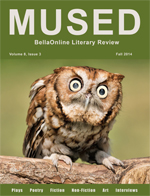Craig W. Steele – In His Own Words
I never intended to be a poet. I was always, in my mind, a fiction writer, primarily of short stories and picture books, with an eye to becoming a novelist, some day. I began writing poetry (starting with haiku) as an exercise to improve my fiction writing ? to increase its expressiveness, its rhythm, its imagery, and to be able to do so in a minimal space with minimal words. While that did happen, one day I realized I was writing poetry more often than fiction, writing poetry because I enjoyed writing poetry, not just as a writing exercise, until I realized I rarely wrote fiction anymore and had become a poet.
Considering my back alley journey to poetry, it’s not surprising I consider poetry to be the ultimate short story form, not just narrative poetry, but also lyric poetry (although lyric poems are typically considered “snapshots,” every photograph I’ve ever viewed always held a story), and even the diminutive haiku. Poetry, to me, expresses the story, imparts the essence of the experience through imaginative, emotion-evoking word choices, sound and rhythmic (though not necessarily metered) language to make the moment meaningful to the reader (not that the poem has to necessarily have “meaning” or “mean” something, but that it be meaningful).
I’m definitely a person of routine when it comes to writing poetry. I always write poetry in a Mead 9.5 x 6 inch, spiral-bound, college-ruled notebook with a red cover, using a mechanical pencil (I used to swear by Ticonderoga #2 pencils, but I love extra-sharp points and got tired of stopping every few minutes to sharpen them) while relaxing in a rocker/recliner in our family room. So, nothing overly unusual or quirky there; no set times for writing, no other special routine. I have discovered that when a poem is being difficult, switching to some other form of paper, such as a 3 x 5 inch blank index card or a Post-it note, helps tease it out, after which it’s transferred to the Mead. I can revise a poem anywhere, however (at the kitchen table, in the shower, in my office at work, on my treadmill, while driving my car), and can even do so at the computer. But, I only compose fiction, creative non-fiction and the science writing I do for my day job at the computer (and never on paper). I also have a different “feeling” in my head when I’m writing fiction or non-fiction or science manuscripts, compared to when I’m writing poetry.
I’m often asked where I find inspiration for poems. My answer: Inspiration is where you find it. Sometimes a single word or phrase in something I’m reading or from an overheard conversation will tickle my muse. Much of my inspiration comes from observing nature, a skill that writing haiku helped develop. But my most potent source of inspiration is my family. If not for my wife and our two children, I doubt I’d have written more than a quarter of the poems that I have.
I’ve never received much inspiration from writing prompts, however, although I know many people thrive on them. And if a prompt does inspire me, it’s usually a visual or graphic prompt (painting or photograph) rather than a written prompt. My muse usually reacts to writing prompts with a brief, but painfully intense, period of anxiety and stress, with me staring into space with a blank mind trying desperately to come up with something related to the prompt. I used to worry about this, thinking I was lacking some vital creative spark. Nowadays, I give myself permission to just let an unproductive prompt go.
As far as advice to other poets and writers (I prefer suggestions; “advice” seems a bit haughty), I’d say: (1) Read as much as you can, not just in the genre in which you write, but also genres in which you have no interest, that have no connection to your writing, or that you might even hate. The brain is a mysterious machine and we can’t predict what fortuitous cross connections might occur; (2) Never give up … and when you do, realize deep down it’s only a temporary break; (3) Perseverance pays off and often timing is everything in getting published; and 4) You don’t have to get published to be a writer or a poet or to enjoy writing. Publication is fluff, the icing on the cake. What’s important is baking the cake and discovering that it’s tasty without any icing. And then, when (not if) you get published, the thrill of “icing the cake” is indescribable, every time!

